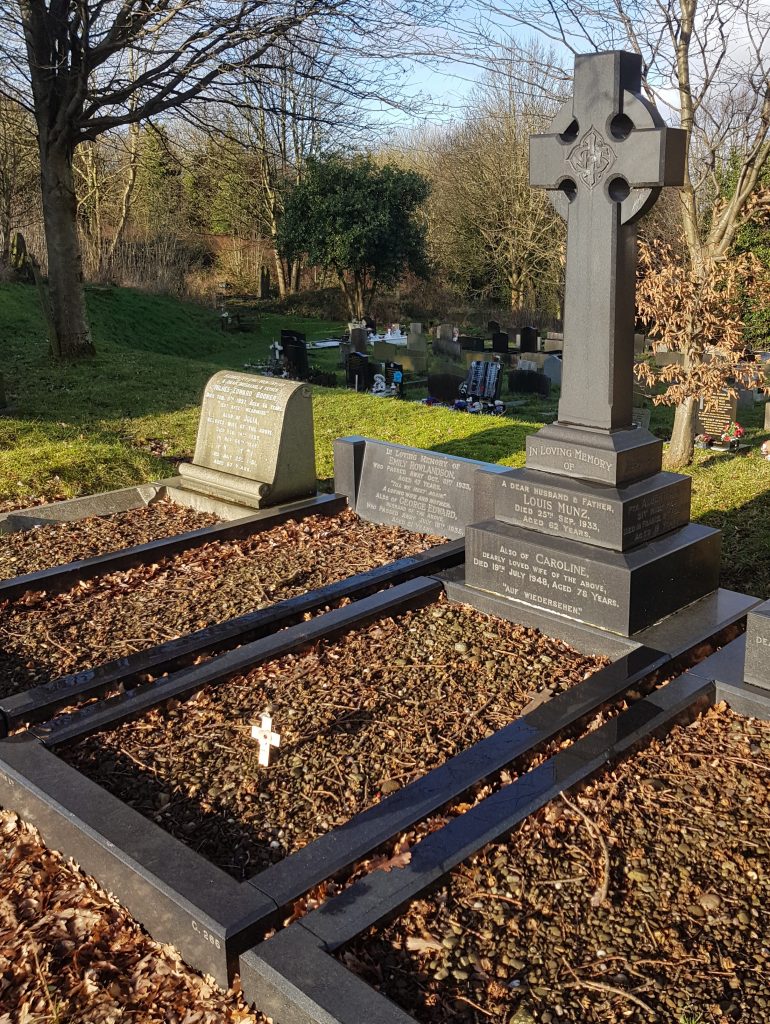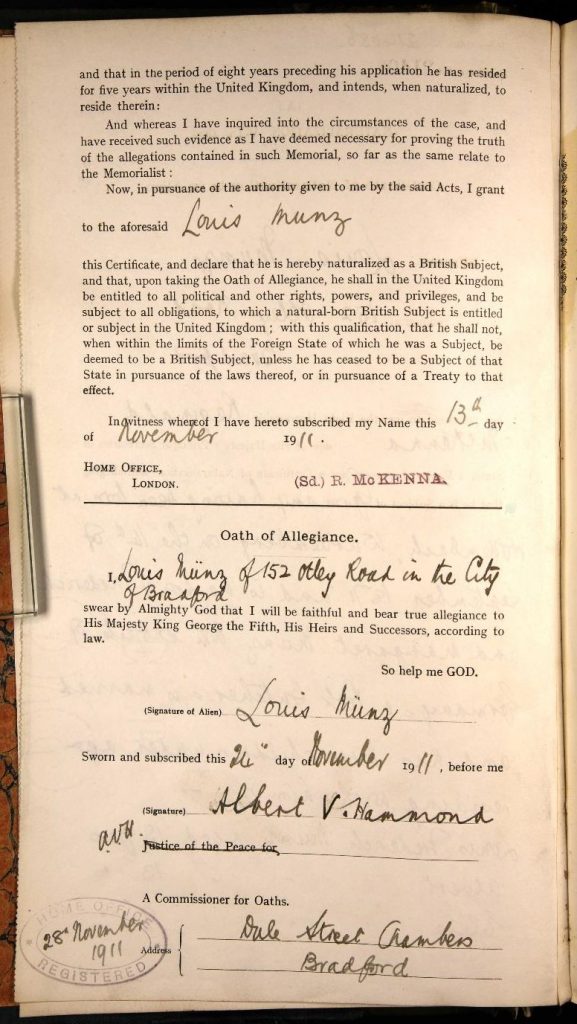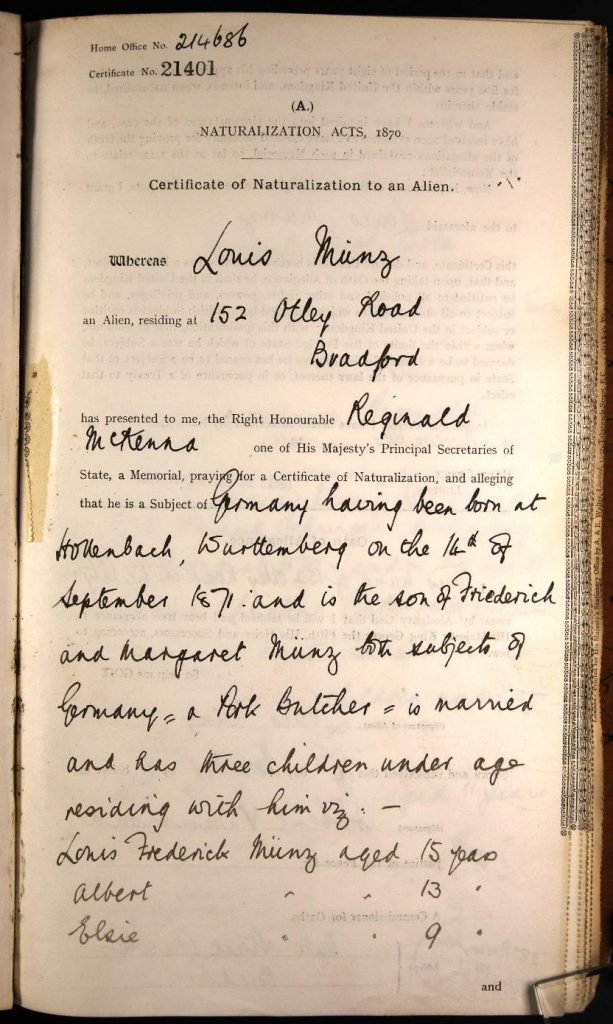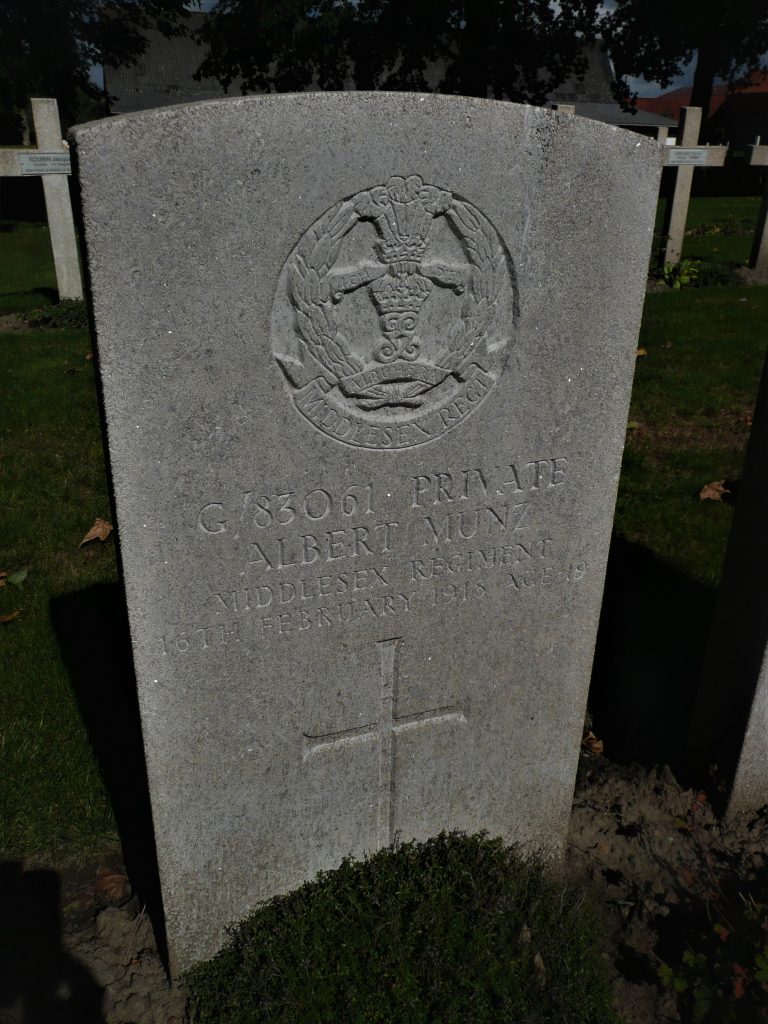Albert Munz

One of the first things you see when looking at the family Munz monument is the German inscription ‘Auf Wiedersehen’ meaning ‘Until We Meet Again’ in English. Here’s the sad family story and the facts leading to it for the Munz family.
Louis Munz was born on 14 Sept 1871 in Hollanbach in the Bavarian region of Germany,the son of Friederich and Margaret. Louis and his wife Caroline came to England as did thousands of their compatriots to capitalise on Britain’s flourishing industrial and business expansion. Many moved into Bradford’s booming textile trade which led to the area in which many of them lived being known as Little Germany as it still is now. Others like Jacob Behrens expanded into other areas of education, philanthropy and civic leadership and made a major contribution to Bradford’s prestigious status as ‘Wool Capital Of the World’. Another popular career path for German newcomers to the UK was pork-butchery, and this was Louis’s career choice in Bradford.
Munz Pork Butchers were based at 152, Otley Road, the building no longer standing but was very close to where the East Ward Labour Club is now. The 1911 census shows the inhabitants as Louis and Caroline, their 3 children Louis Frederick aged 14, Albert aged 12 and 9 year old Elsie along with Charles Mohrer, a business assistant and Marie Krosperrin ‘servant’, it must have been a prosperous shop.
On 13 Nov 1911 Louis, became a naturalised UK citizen, a condition of which was that over a period of 8 years preceding his application, a minimum of 5 consecutive years must have been living in the UK. Louis signed a declaration “I swear by Almighty God that I will be faithful and bear true allegiance to His Majesty the King George the Fifth ,his heirs and successors according to the Law, so help me God.” We’ll see how this was acknowledged by the military authorities regarding his sons soon.


After the Munz’s first came to England, Louis Frederick or Fred as he was known, was born in Dewsbury, Albert and Elsie were both Bradford born and bred, in Thornton before moving to Undercliffe. Albert and Fred both worked in the family shop before, in 1917, they enlisted into the British Army to fight against ‘the German Hun’. One can only imagine the family discussions between Albert and Fred and their German parents at that time. They joined up in Halifax as did thousands of Yorkshiremen to join one of the Yorkshire regiments. However, in March 1917 two battalions of soldiers were formed from Army Council Instruction 1209, to be manned exclusively by recruits who were naturalised British citizens but of enemy alien parentage.
Albert and Fred, due to their surname and family backstory were prohibited from joining a Yorkshire regiment as many of their school friends and pals will have done, but were allocated to the Middlesex Regiment 31st Battalion a.k.a The Kaisers Battalion. In late 1916 into 1917 as the war that was expected to be ‘over by Christmas 1914’ and had suffered the Battle Of the Somme with no apparent end close, such was the ill feeling, dislike and in some instances hatred for the German nation in the UK generally at the time, that the authorities felt it right and proper to alienate all soldiers with German sounding surnames away from home battalions, to be policed strictly and to avoid any issues of conflict of interest, that these ‘enemy alien’ soldiers would fight in Labour Companies. These units supported other battalions and wouldn’t be provided with explosives, ammunition or artillery, they would help with ‘cooking, cleaning, carrying and caring for’ fellow soldiers, just in case any conflict of interest and affinity with Germany resulted in any hostilities against UK forces. This was the time our Royal Family changed its name from Saxe-Coburg and Gotha to Windsor.
Interestingly Bradford suffered very little anti-German hostilities during the war, most Bradfordians appreciated the employment opportunities many of their German employers provided and there had been a large and friendly German population in the city for many years before the war. No allowances were made for this for Albert and Fred’s military careers though.
To reflect how the military authorities regarded Albert and Fred’s battalion, there are no known official war diary or records of their actions, which is very unusual, if not unique, and as such it’s difficult to trace their military actions. We do know that Albert died on 16 Feb 1918 aged 19 and is buried in the massive Lijssenthoek Cemetery in Belgium. Ironically it is very close to a plot of German soldiers who died having been cared for in the nearby military hospital, one of them being Army Reservist August Munz who died 20 Nov 1918 that’s 9 days after Armistice Day. Albert’s family paid their tribute to him in the Bradford Weekly Telegraph – “A loving son a brother kind, a beautiful memory left behind, O God above in thy good grace, find in thy heart for him a place.”

Fred, the elder brother, survived the war and married Ethel Midgley at Bradford Cathedral in 1921, her being daughter of the landlord of ‘The Brownroyd Hotel’ on Thornton Road and they made home in Weymouth, Dorset where he died in late 1971.
A final sad twist to the family story is that when the Bradford Roll Of Honour was compiled after the Great War to record those lost, Albert’s parents gave his regiment as 3rd Middlesex. This was a regular unit of ‘normal’ soldiers with home sounding surnames. Their reluctance to provide the accurate 31st Battalion, he was with, perhaps hides their reluctance to acknowledge the hurt the family must have endured at the time.
You can find the Albert Munz monument using the what3words App and website. Follow this link and select satellite view. Click Here. If you are using the App on your phone type in option.origin.dates in the search box.

